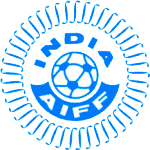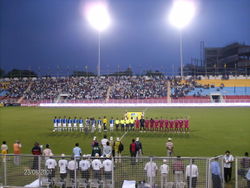India national football team
 |
||||||||||||||||
| Nickname(s) | The Bhangra Boys | |||||||||||||||
|---|---|---|---|---|---|---|---|---|---|---|---|---|---|---|---|---|
| Association | All India Football Federation | |||||||||||||||
| Confederation | AFC (Asia) | |||||||||||||||
| Captain | Bhaichung Bhutia | |||||||||||||||
| Most caps | Bhaichung Bhutia (102) | |||||||||||||||
| Top scorer | Bhaichung Bhutia (42) | |||||||||||||||
| FIFA code | IND | |||||||||||||||
| FIFA ranking | 138 | |||||||||||||||
| Highest FIFA ranking | 94 (February 1996) | |||||||||||||||
| Lowest FIFA ranking | 165 (March 2007) | |||||||||||||||
| Elo ranking | 141 | |||||||||||||||
|
||||||||||||||||
| First international | ||||||||||||||||
(London, England; July 31, 1948) |
||||||||||||||||
| Biggest win | ||||||||||||||||
(Bangalore, India; December 16, 1963) |
||||||||||||||||
| Biggest defeat | ||||||||||||||||
(Moscow, USSR; September 16, 1955) |
||||||||||||||||
| AFC Asian Cup | ||||||||||||||||
| Appearances | 2 (First in 1964) | |||||||||||||||
| Best result | Runners-Up, 1964 | |||||||||||||||
|
Honours
|
||||||||||||||||
The Indian national football team is the national football team of India and is governed by the All India Football Federation. It is a member of the Asian Football Confederation. Since 1948, the AIFF has been affiliated with FIFA, the international governing body for football. In 1954, AIFF became one of the founder members of the Asian Football Confederation (AFC). At the peak of its success during the 1950s and 60s, the team qualified for the 1950 FIFA World Cup, although it did not travel to the tournament in Brazil, won gold medals at two Asian Games, and held the record for the best performance by an Asian football team at the Olympics.
Contents |
History
1900-1970
Indian teams started touring Malaysia, Singapore, China and Japan in late 1930s. Soon after the success of several Indian football clubs, the All India Football Federation (AIFF) was formed in 1937. The 1948 London Olympics was India's first major international tournament, where a predominately barefooted Indian team lost 2-1 to France, failing to convert two penalties. The Indian team was greeted and appreciated by the crowd for their sporting manner.[1]
The period from 1951 to 1962 is considered the golden era in Indian football. The Indian team started the 1950s with their triumph in the 1951 Asian Games which they hosted. India beat both Indonesia and Afghanistan 3-0 to reach the final where they beat Iran 1-0[2]. In 1952, India continued their form by winning the Colombo Quadrangular Cup held in Sri Lanka[3].
Later that year they went on to participate in the 1952 Olympics, but lost 10-1 to Yugoslavia. As four years earlier, many of the team played without boots.[4] After the result AIFF immediately made it mandatory to wear boots[5].
India also won three further editions of the Quadrangular Cup, which were held in Burma, Calcutta and Dhaka in 1953, 1954 and 1955 respectively.[6]. India then went on to finish second in the 1954 Asian Games held in Manila.[7]
At the 1956 Olympic Games they finished fourth, which is regarded as one of finest achievements in Indian football. India first met hosts Australia, winning 4-2 with Neville D'Souza becoming the first Asian to score a hatrick in the Olympics and also making India the first Asian team to reach the Olympic semi-finals. They lost 4-1 to Yugoslavia, and lost the third place play-off match 3-0 to Bulgaria.[8]
India later participated in the 1958 Asian Games in Tokyo where they finished fourth,[9] and the Merdeka Cup 1959 in Malaysia finishing second.[10].
India started off 1960 with Asian Cup qualifiers in which they failed to qualify.[11] India went on to win the 1962 Asian Games where they beat South Korea 2-1 in the final,[12] and two years later finished second in the Asian Cup which was held in round-robin format.[13]. India played in the Merdeka Cup in 1964, 1965 and 1966 where they finished 2nd, 3rd and 3rd respectively.[14]
India later played in the Asian Games in 1966 in Bangkok but were eliminated in first round.[15] India took third place in the 1970 Asian Games, beating Japan 1-0 in the third place, play-off[16] but have failed to qualify for other major tournaments, other than as host, only once since that time.
1971-date
Failure in a series of qualification tournaments meant that the next time India reach a quarter-final stage was as host in the 1982 Asian Games.[17]
In 1984 India successfully qualified for the Asian Cup again,[18] but failed to make any impact.[19]. India won gold medals in the SAF Games of both 1984 (in Dhaka) and 1987 (Calcutta). They won the inaugural SAARC Cup in 1993 in Lahore, and finished runner-up in Colombo two years later. By 1997 the competition had been renamed as the SAFF Cup, and India won it in both 1997 and 1999 edition, when they hosted it in Goa.[20]
2010 Season
The team started off the year with one friendly against Al-Shaab winning the match 3-1. They then left on June 30 for a two month camp in Portugal to prepare for the 2011 Asian Cup, by playing friendlies against 2nd Division Portuguese sides. It has been confirmed that the national team is scheduled to play at least 5 International friendlies in the 2010 calendar.The Teams India Plays are Thailand,DPR Korea,Turkemenistan.
Portugal Tour
Indian football team played 10 friendly matches against second and third Division Portugal clubs, with winning 6 losing 2 and drawing 2. India played their first match against Caldas SC winning 4-1, with Abhishek Yadav, NP Pradeep, Steven Dias and Baldeep Singh scoring for India[21]. Indian national team played U.D. Serra on August 18 and won 3-1[22] with Sunil scoring a brace also played C.D. Mafra on August 19 and lost the match 1-0[23].India is scheduled to play Sertanense FC on Tuesday 8/24[24].
Kit
India traditionally wear a blue strip. As of 2010, Nike, Inc is the kit provider to the national team, with Panasonic as sponsoring partner.
Manager
| Name | Nat | Tenure |
|---|---|---|
| Syed Abdul Rahim | 1950–1962 | |
| Harry Wright | 1963–1964 | |
| Pradip Kumar Banerjee | 1981–1982 | |
| Bob Bootland | 1983 | |
| Milovan Ciric | 1984 | |
| Pradip Kumar Banerjee | 1985 | |
| Syed Nayeemuddin | 1986 | |
| Amal Dutta | 1987 | |
| József Gelei | 1990–1991 | |
| Syed Nayeemuddin | 1992 | |
| Jiří Pešek | 1993–1994 | |
| Rustam Akramov | 1995 | |
| Syed Nayeemuddin | 1997–1998 | |
| Sukhvinder Singh | 1999–2002 | |
| Stephen Constantine | 2002–2005 | |
| Syed Nayeemuddin | 2005–2006 | |
| Bob Houghton | 2006– |
Performances
World Cup record
- 1930 to 1938 - Did not enter
- 1950 - Qualified but withdrew
- 1954 - Entry not accepted by FIFA
- 1958 to 1982 - Did not enter
- 1986 to 2010 - Did not qualify
Asian Cup record
- 1956 - Did not enter
- 1960 - Did not qualify
- 1964 - Second Place
- 1968 - Did not qualify
- 1972 to 1980 - Did not enter
- 1984 - Round 1
- 1988 to 2007 - Did not qualify
- 2011 - Qualified
SAFF tournament record
|
||||||||||||||||||||||||||||||||||||||||||||||||||||||||||||||||||||||||||||||||||||||||

AFC Challenge Cup record
Nehru Cup record
|
|||||||||||||||||||||||||||||||||||||||||||||||||||||||||||||||||||||||||||||||||||||||||||||||||||||||||||||||||||||||||||||||||||||||||||||||||||||||||||||||||||||||||||||||||||||||||||||||||||||||||||||||||||||||||||||||||||||||||||||||||||||||||||||||||||||||||||||||||||||||||||||||||||||||||||||||||||||||||||||||||||||||||||||||||||||||||||||||||||||||||||||||||||||||||||||||||||||||||||||||
